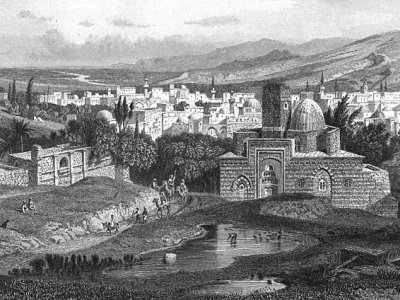
SYRIAN RENDITION
What do you do when your whole life depends on believing something that in a flash you find out isn’t true?
We form our views over years and they don’t easily change. And we surround ourselves with people who think the same way we do, which only reinforces our opinions.
It’s not easy thinking yourself into the skin of someone who lived so long ago, but it’s worth it in the conversion of Saul.
He was highly clever, motivated and trained in his faith, being so very sure of the view that the Jesus sect had to be eradicated because it was idolatrous and wrong. Idolatrous because it asked people to worship a mere human being: Jesus of Nazareth. And wrong because Jesus didn’t rise from the dead. It was an assault on all he held dear. And he was deeply angry in his sense of righteousness.
Saul was thorough, prepared to travel as far as Damascus to seek out and destroy any who followed this Jesus cult. And yet on that road, in a blinding flash, he learned he was completely in the wrong. The thing about Jesus is he makes the offer for people to follow him but does not compel us to. All except Saul. When you encounter Jesus like Saul did, there is no option but to follow him.
It was like an extraordinary rendition. One moment Saul is on a quiet road, the next a van draws up alongside and he is bundled into the back, unable to see and in the hands of his enemies who take him to a house in downtown Damascus.
It was good news for Saul, because he learned how much Jesus loved him. But it meant death to his old way of life, and death threats from former friends for the rest of his life.
A little time later, in Damascus, a follower of Jesus called Ananias receives a vision from God that tells him to go to a street called Straight to find a house where Saul of Tarsus is waiting for him to heal him of the temporary blindness he had experienced in his encounter with Jesus.
We think of Saul being shocked by his rendezvous with Jesus, but we don’t stop to think how Ananias would have felt. The early Church had enjoyed some heady days after Pentecost, when the people of Jerusalem admired their joy, togetherness and gifts of healing. But his Church was now heading into an unprecedented time of persecution. Stephen, a leader in that Church, had been brutally stoned to death and the believers had been scattered across the middle east. But there was no sanctuary because people like Saul were coming after them. The attacks were personal, rigorous and sustained. Some would die violently, others would be locked up in appalling prisons. What we term human rights did not apply to the Jesus sect.
So, try to get into the skin of Ananias. The vision was very specific, but could he be sure it had come from the Lord when, if it had not, Ananias would be handing himself over to his biggest enemy to lose either his liberty or his life? Even when Ananias accepted the vision had come from God, he argued the case in prayer: really, you want me to meet up with Saul for coffee and give him a helping hand and a listening ear?
But God answers with the word he often does. Go, he says. For this is no small matter. God has plans for Saul. Big plans.
When Ananias finds the house, goes in and sees Saul, we are faced with two men on the very edge, unable to trust each other. One misstep from either of them could prove fatal. And possibly the end of Sau’s calling before it even began.
And then Ananias utters two simple words that, in their simplicity, we can easily gloss over.
Brother Saul, he says.
Two enemies who had never met before. One sure the other should die. The other knowing he thought that. The chasm between them was enormous. They had no time for small talk, the moment was too volatile and dangerous for that. And Ananias takes hold of the meeting and calls his enemy his brother. And in that moment, that word, the world tilted on its axis and changed for ever.
Two enemies. One destiny. One word. Brother.
POPULAR ARTICLES

Obama's Covert Wars
The use of drones is going to change warfare out of all recognition in the next decades.

Through A Glass Starkly
Images of traumatic incidents caught on mobile phone can be put to remarkable effect.

What Are British Values?
Is there a British identity and if so, what has shaped the values and institutions that form it?


